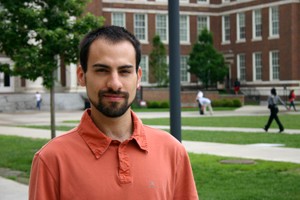
Cryptography: Using Math to Keep Computers Secure
Data security. Its a chief concern in a society that revolves around digital prowess. With varying online activities, from communicating and shopping to filing taxes and paying bills, an abundance of private information is sent out into cyberspace.
Its the job of cryptographerspeople who develop algorithms to ensure secrecy, integrity and authenticity of informationto make sure that information remains secure.
Faculty and students in the
Applied Algebra and Cryptography Group
, led by Mathematical Sciences Professor Jintai Ding, are doing just that. The interdisciplinary group, consisting of people from the
Department of Mathematical Sciences
in the McMicken College of Arts and Sciences and in the Department of Computer Science in the College of Engineering & Applied Science, is using algebra to solve problems in coding theory, cryptology and other areas of computer security.
A popular method of computer security involves public key encryption, a process through which a public key is used to encrypt a message that only a secret complementary private key can decrypt.
The technology is widely used, but the security is being jeopardized by a new generation of attacks called algebraic attacks.
An algebraic attack consists of deciphering an encrypted message by solving a system of polynomial equations, says Daniel Cabarcas, a PhD student in the Department of Mathematical Sciences. For virtually any encryption scheme, the problem of finding the secret key can be translated into a problem of solving a system of polynomial equations. We investigate the scope of these attacks by studying the complexity of solving systems of polynomial equations.
Cabarcas, a Taft Graduate Dissertation Fellow, was recently named a Distinguished Dissertation Fellow by the Graduate School for his project, Mutant Domestication, a Revolution in Polynomial Solving and Cryptanalysis.
He came to UC as a masters student in the computer science program after spending his undergraduate career in his home country at University of Colombia. When he started working closely with Professor Ding (now his advisor) on cryptography, he switched to the PhD track in Mathematical Sciences. He earned his MA in computer science this year and will earn his PhD in 2011.
The most interesting part of his cryptography research, Cabarcas says, is the interaction between math and computer science. There is a permanent tension between ideas that lead to fast algorithms and the need for a solid ground that allows us to make firm statements.
Fast algorithms indeed. In 2006, Ding discovered mutant polynomialscertain lower degree polynomials that can be used to increase speed and efficiency of security systems. This year Ding, Cabarcas and their collaborators at the Technical University of Darmstadtled by Professor Johannes Buchmann, director of the Center of Advanced Security Research Darmstadt in Germanywere able to introduce the worlds fastest and most memory-efficient polynomial solver, called the Mutant Gröbner Basis Algorithm (MGB).
As the heart of his research, Cabarcas anticipates mutant polynomials to have a significant impact on computer security.
I hope my research will yield accurate security levels for algebraic attacks to cryptographic schemes and fast polynomial solvers, he says.
Accurate security levels will increase security in communications and improve confidence in public networks like the Internet. As an economic motor or as a free communication hub, improved Internet security can have a great impact in communities.
Read more news about the Department of Mathematical Sciences:
Assistant Professor Michael Goldberg comes to the math department from Johns Hopkins University.
McMicken grad Robert Tkach is called one of "two pioneers of the science of optical nonlinearities in fiber optic communication systems."
Crunching Numbers for More Accurate Blood Tests
Statistics professor Paul Horn uses his expertise on reference intervals to help create guidelines set by the Clinical and Laboratory Standards Institute.
Related Stories
UC mourns the passing of former first lady Carol R. Steger
August 19, 2025
Carol R. Steger, former first lady of the University of Cincinnati, died on August 12, 2025 at the age of 85. Steger served as UC’s first lady from 1984 to 2013. Her husband, Joseph A. Steger, was UC’s 24th president and had the second-longest term in the university’s history. President Steger died in 2013.
Monarch butterflies use internal compass for epic migration
August 18, 2025
Biologists at the University of Cincinnati found that monarch butterflies have an internal compass that is influenced by temperature to help navigate.
New UC engineering course blends academia and industry
August 18, 2025
As the global demand for renewable energy accelerates, the University of Cincinnati is preparing its students to making meaningful contributions. The College of Engineering and Applied Science now offers a graduate-level course that combines industry and academia, teaching students the capabilities of utilizing hydrogen as a fuel source.
